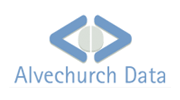Choose the right tool
Storing names and addresses is one of the ways that a computer can help
with the running of a small organisation. If you've got this information
on a PC then you'll find it easier to produce customer lists, to print
envelopes or mailing labels, or just to retrieve someone's phone
number.
You have three obvious ways of approaching the problem. All have their
advantages and disadvantages. Make sure that you pick the right one.
Word Processor
The simplest way is just to type the names into a word processor. This
is quick and easy but you'll find it difficult to do anything useful once
you've got more than a few pages of entries. A list of names and numbers
can be displayed in a neat format in Word but there is little scope for
arithmetic or analysis.
Spreadsheet
The next step up is to use a spreadsheet. Use one column each for name,
address, phone number etc and put each customer's details on a new row.
This is not really what the spreadsheet was invented for but at least
you'll be able to search through the entries, sort them into alphabetical
or date order, and use the spreadsheet as the basis for printing a run of
labels or form letters.
This can be a good solution for a small number of entries and many Access
databases start life as an Excel spreadsheet.
Database
One disadvantage with spreadsheets is that you're stuck with the rows and
columns unless you put lot of effort into designing forms. With a
straightforward spreadsheet you can spend a lot of time scrolling up and
down the screen to find the entry you want and then scrolling from
side-to-side because the screen isn't wide enough to show an entire
address. A database gets around this problem.
A database is more difficult to set up because you've got to define a
structure for the data before you start. The columns in a spreadsheet
can contain any mix of data but the fields of a database have to be set
up to hold the right amount of the right sort of data. If your database
allows thirty characters for the address then thirty characters is all
that you can have.
The advantage of this structure is that you can process the data much more
quickly and efficiently and you can use the structure to display the
information you want in the format that makes it easiest to read. You
can have one screen that shows a full list of customers' names, another
that shows their full names and addresses one at a time, and another that
only shows the amounts owing on overdue invoices.
|

